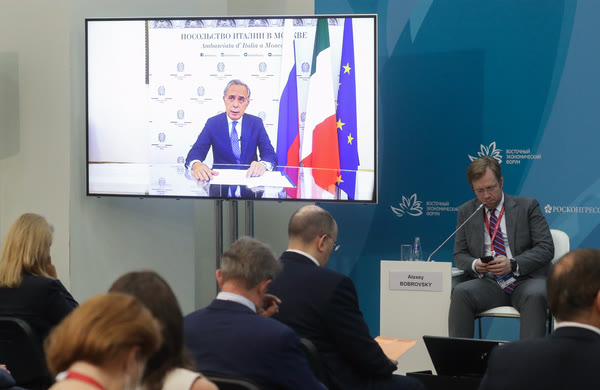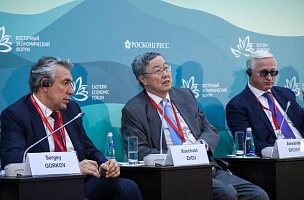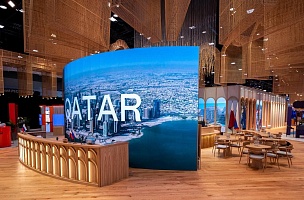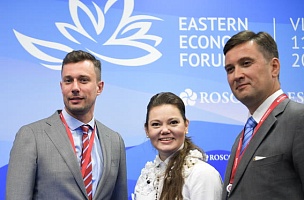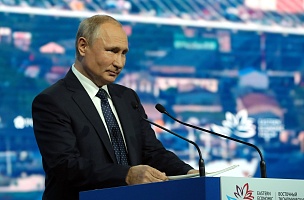CONCLUSIONS
Italian entrepreneurs consider the Russian Far East a promising region
“There is interest in special economic regimes, such as the advanced special economic zones (ASEZs) and the Free Port of Vladivostok,” Antonio Fallico, President, Conoscere Eurasia Association; Chairman of the Board of Directors, Banca Intesa.
“Another characteristic of the Russian Far East is the major role of foreign economic activity in the region’s economic structure. A focus on foreign markets could be of particular interest to Italian entrepreneurs and even to Banca Intesa,” Antonio Fallico, President, Conoscere Eurasia Association; Chairman of the Board of Directors, Banca Intesa.
“I want to stress not only the enormous potential of the Russian Far East in terms of developing bilateral cooperation (Russia–Italy – Ed.), but also want to note that it is possible to develop trilateral cooperation between Italy, Japan, and Russia,” Giorgio Starace, Ambassador Extraordinary and Plenipotentiary of the Italian Republic to Japan.
“At this time, this part of Russia is strategically and geopolitically significant with respect to the global East. We know that its importance will continue to grow in the future,” Antonello Colussi, President, Danieli Russia; Chairman of the Board of Directors, Danieli Volga.
Italian tech companies can make a significant contribution to economic cooperation with Russia
“Rosneft values the technological competencies of Italian companies. <...> The development of the Vostok Oil strategic project is worth mentioning. <...> We are certain that the future participation of Italian suppliers and contractors in such an important project could make a significant contribution to trade and economic cooperation between Russia and Italy,” Oksana Tarasenko, Corporate Secretary in the Vice President Rank, PJSC Rosneft Oil Company.
The Russian economy's current level of transparency provides foreign entrepreneurs with security
“The Russian Far East has started to develop differently from how it did in the 90s. The grey economy that used to define the Russian Far East has become a white economy. And you can truly do business without fear of certain risks,” Vittorio Torrembini, President, Association of Italian Entrepreneurs in Russia (GIM Unimpresa).
PROBLEMS
Foreign investors are not completely aware of the opportunities available in the Russian Far East
“Italian businesses need to learn more about the opportunities, demand, potential, and conditions of operating in the Russian Far East and not fall back on excuses about complexity. In reality, this is simply a case of a lack of information or even a lack of curiosity. <...> Foreign businesses should find taking advantage of the opportunities afforded by these special zones to be straightforward and accessible. These opportunities are poorly represented in Europe, which makes it difficult to demonstrate the investment potential of the region,” Antonio Fallico, President, Conoscere Eurasia Association; Chairman of the Board of Directors, Banca Intesa.
“The majority of companies (seeking to expand abroad – Ed.) are small and medium-sized enterprises. Many of them are entering a different culture, without anything to guide them. It is important to share experiences and knowledge,” Rosario Pedicini, General Manager in Tokyo, Intesa Sanpaolo SpA.
“First, is the lack of real commercial information about promising commercial projects that might interest Italian partners,” Vladimir Padalko, Vice President, Chamber of Commerce and Industry of the Russian Federation.
Trade and economic relations between Russia and Italy are currently underdeveloped
“Unfortunately, there's currently not much to boast about in the business activity between Italy and the Russian Far East. According to Russian customs, the region’s export to Italy in 2020 amounted to just USD 4 million, while import amounted to 142.7 million. <...> The trade figures with Italy remain modest, even taking into account the contraction of trade during the crisis. For context, the foreign trade turnover of the FEFD in Q1 of 2021 was USD 7.1 billion,” Antonio Fallico, President, Conoscere Eurasia Association; Chairman of the Board of Directors, Banca Intesa.
Italian businesses have a hard time adapting to the high volatility of the Russian market
“The second point is related to the volatility of the legal measures and initiatives that are being implemented. They don't have time to study them and can't make sense of our environment. <...> It turns out that this is an area of increased risk. Entrepreneurs are afraid to lose the funds that they would invest here (in the FEFD – Ed.). Which means that we lack certain measures that would eliminate this fear: we don't provide them with mechanisms to insure their investments and we don't provide them with information about partners operating locally,” Vladimir Padalko, Vice President, Chamber of Commerce and Industry of the Russian Federation.
“At the moment, the primary risk for projects under development is currency volatility. It is currently difficult to make forecasts and join projects with a payback period of over three years,” Pavel Serebryakov, Chairman of the Board of Directors, Management Company Slavda.
SOLUTIONS
Actively informing potential partners about the realities of operating in the FEFD
“The creation of a single information platform for businesses in Far Eastern institutions would be particularly helpful. It would allow entrepreneurs to receive and make offers, send inquiries, and find partners for implementing projects. <...> We want to take advantage of the opportunities that your region has to offer. We would support a proposal to create a working group,” Antonio Fallico, President, Conoscere Eurasia Association; Chairman of the Board of Directors, Banca Intesa.
“The bank (Intesa – Ed.) plays the role of an observer. We provide financial support, but also consult with companies. The bank tries to work in line with the efforts of the diplomatic representative office and with entrepreneur collectives. <...> The bank is of primary importance to small and medium-sized enterprises when they enter into unfamiliar regions and want to expand their business in those markets,” Rosario Pedicini, General Manager in Tokyo, Intesa Sanpaolo SpA.
“For our part, as an SME organization, we can help provide support to projects (of Italian entrepreneurs – Ed.). We have an office in each region and several hundred entrepreneurs, through whom we can provide recommendations. We can provide a certain level of hospitality for an Italian entrepreneurs, because the countries do differ quite a bit. I call for creating more business projects,” Alexander Kalinin, President, All-Russian Non-Governmental Organization of Small and Medium-Sized Businesses OPORA RUSSIA.
“Information about the development potential and incentives provided by local authorities needs to be spread,” Pasquale Terracciano, Ambassador Extraordinary and Plenipotentiary of the Italian Republic to the Russian Federation.
Localizing production could improve foreign companies’ success in Russia
“Over the last 15 years we have been implementing a specific strategy in the Russian market: one that focuses on decentralizing production. <...> We first gained experience with this in Tver and then Novosibirsk. Thanks to this experience, we ended up in Vladivostok, without having faced any insurmountable difficulties,” Sandro Bergamo, Managing Director, DKC Group.
“Localizing production in Russia is a pre-requisite for us. Out of the EUR 300 million turnover in Russia, 75% of this sum consists of products created directly and exclusively in Russia, while just 25% are imported from abroad,” Sandro Bergamo, Managing Director, DKC Group.
“Thanks to the strategic position of the Russian Far East and the availability of skilled workers across Russia, the Russian Federation could be a reliable supplier of high-quality products to the Far East and the Pacific region. Italy, with its tradition of and experience in export, is ready to provide its know-how to Russia and this region specifically,” Pasquale Terracciano, Ambassador Extraordinary and Plenipotentiary of the Italian Republic to the Russian Federation.
Developing events on insuring against risks for foreign entrepreneurs
“It is impossible (to move forward - Ed.) without creating new programmes to support export and import and without new forms of risk hedging,” Pavel Serebryakov, Chairman of the Board of Directors, Management Company Slavda.
For more information, visit the Roscongress Foundation's Information and Analytical System at roscongress.org/en.


